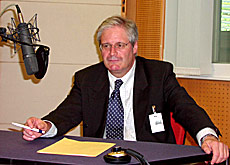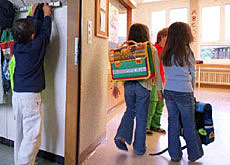“Children are not objects”

Switzerland could be doing more to guarantee the rights of children, according to the newly elected member of a key United Nations committee.
Jean Zermatten, who founded the Sion-based International Institute for the Rights of the Child, also told swissinfo that one of his goals was to help eradicate child labour around the world.
Zermatten was born in the Swiss city of Sion in 1948 and spent more than three decades working as a juvenile-court judge.
The 57-year-old has worked as an independent consultant on a number of projects in the field of juvenile legislation in various Swiss cantons. He has also carried out assignments for the Geneva-based UN Children’s Fund (Unicef).
Earlier this year Zermatten was appointed to the UN Committee on the Rights of the Child, the body which monitors implementation of the 1989 Convention on the Rights of the Child.
Switzerland ratified the convention in 1997.
swissinfo: You were a juvenile-court judge for more than 30 years. What do you remember of that time?
Jean Zermatten: I spent 33 years of my life doing that. You can’t do that kind of work for such a long period of time unless you really are motivated. And right from the very beginning I was passionate about my work. What I really enjoyed during that period of my life was the contact I had with families and children.
I have also had the opportunity to leave Switzerland and gain different insights [beyond the daily work I was involved with] and my joining the UN committee is in some sense a logical step forward.
swissinfo: You must have enjoyed a certain amount of autonomy as a judge. But your work within the vast institution that is the UN must be very different…
J.Z.: You’re absolutely right that it is very different. In the old days I was able to organise my schedule as I liked. I was the person in charge. But now I am one of 18 members of a committee… so it is much more of a group effort.
Also I no longer have the direct contact [with young people] that I used to have… and then of course there is the UN itself, which some people call a “huge machine”. It’s not for me to make such judgements. All I can say is that is a big place and that it is a bit difficult to feel at home after just one month of learning the ropes.
swissinfo: But do you nonetheless have the feeling that you can move forward [within the confines of the UN] and carry out the task in hand?
J.Z.: If I didn’t think I could do the work I wouldn’t have accepted the post! In fact there is a tremendous amount to be done and the Committee on the Rights of the Child has not been waiting around for me to turn up to carry out useful work. And if you look at the reports [compiled by the committee] you can see that there has been real progress.
swissinfo: Are there some aspects of your work on the committee that are more important to you than others?
J.Z.: What I am most attached to is the idea that a child is neither an object nor a commodity. Every child is an individual and a complete person with his or her own rights. When the world has understood that, we will already have achieved a lot.
Right now the majority of [human-rights] violations which we see are linked to the fact that children are considered as objects that can be borrowed, exchanged, sold or maltreated.
swissinfo: What can the Committee on the Rights of the Child do to ensure that children are not treated in this way?
J.Z.: One thing we do is submit reports on the child-rights situation in the 192 countries which have signed the [1989] Convention on the Rights of the Child.
This is a way of putting pressure on manufacturers and employers. Take the example of children who are employed to sew footballs together. With the help of the [Verbier-based] World Federation of the Sporting Goods Industry we have succeeded in almost entirely wiping out child labour in the two valleys located on the border between India and Pakistan.
swissinfo: Could Switzerland be doing more to defend children’s rights at home?
J.Z.: Switzerland still has some work to do. On the domestic front, it needs to ensure that legislation takes into account the Convention on the Rights of the Child. The country does not score highly in certain areas such as access to crèches… and Switzerland is one of the few countries where there is no minister for children and the family. This leads to a lack of coordination.
There is also a certain amount of inequality when it comes to child-benefit payments. In my canton, for example, you receive SFr360 ($284) per child. But in some other cantons you can get as little as SFr100.
swissinfo: Are you saying that one of the main problems in Switzerland is the country’s federalist structure?
J.Z.: Yes, but this also the case in other countries. In fact, the problem is the same in all countries which have similar [political] systems.
I’ve been busy lately looking at what is going on in Australia, which is soon going to present its report to the committee. In that country you can see how federalism creates inequality, particularly in terms of the juvenile-justice system, where age criteria vary depending on the territory.
swissinfo: What motivates you to carry out your work in the field of children’s rights?
J.Z.: Something very simple: I know that children are very resourceful. Every time I have needed to trust a child and whenever I believed that he or she was capable of solving a problem with a bit of a helping hand, I have not been let down.
I think we often assume that children are totally dependent on adults. We should have more confidence in them.
swissinfo-interview: Alexandra Richard
The UN Committee on the Rights of the Child is made up of 18 members.
Its mandate is to verify that signatory states – including Switzerland – adhere to the UN Convention on the Rights of the Child.
A report is submitted to each participating country every five years.
Jean Zermatten biography:
Born in Sion, Switzerland, in 1948.
Studied law at Fribourg University.
Founded the juvenile court in canton Valais in 1980.
Established the International Institute for the Rights of the Child in 1994.
Appointed to the UN Committee on the Rights of the Child in 2005.

In compliance with the JTI standards
More: SWI swissinfo.ch certified by the Journalism Trust Initiative

You can find an overview of ongoing debates with our journalists here. Please join us!
If you want to start a conversation about a topic raised in this article or want to report factual errors, email us at english@swissinfo.ch.